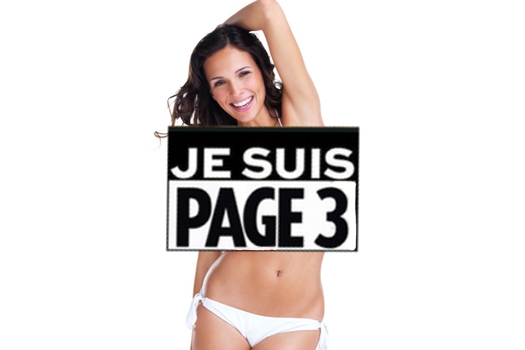‘I for one would be sorry to see them go,’ wrote George Orwell. ‘They are a sort of saturnalia, a harmless rebellion against virtue.’
He was writing about the seaside postcards of Donald McGill in 1941, but his defence of them and their ‘enthusiastic indecency’ could equally well apply to Page 3. Orwell’s argument was that McGill’s caricatures of women, ‘with breasts or buttocks grossly over-emphasised’, gave expression to ‘the Sancho Panza view of life’. There’s a fat little squire in all of us, he thought, although few of us are brave enough to admit it. ‘He is the unofficial self, the voice of the belly protesting against the soul,’ he wrote. ‘His tastes lie towards safety, soft beds, no work, pots of beer and women with voluptuous figures.’
Orwell believed that the art of Donald McGill served as a release valve in a society that was otherwise virtuous and repressed. For the most part, we choose the soul over the body, but a culture in which all manifestations of our animal instincts was expunged would be unbearable. Just occasionally, when we hear ‘sermons against gambling’ and ‘the solidarity songs … of left-wing political parties’, we want to let out a tremendous raspberry, and in Orwell’s view we should be allowed to do so. That included, in his day, being able to buy postcards that vegetarian feminists would consider ‘vulgar’ and ‘obscene’.
OK, Orwell didn’t use the phrase ‘vegetarian feminists’, but he did point out that one of the stock comic figures in McGill’s postcards was ‘the Suffragette’, who always appeared as a ‘feminist lecturer’ or a ‘temperance fanatic’. There’s a link here between feminism and puritanism that I’ll come back to, but first I want to deal with the main objection to the ‘safety valve’ defence, namely, that pictures of naked women are not harmless.
Since it emerged that the Sun has done away with Page 3, plenty of feminists have popped up to claim that there’s a direct link between the ‘objectification’ of the female form and violent assaults against women, including rape. But there’s no evidence of this. I don’t think anyone would dispute that British men’s exposure to pornography has increased since the mid-1990s, what with lads’ mags, satellite television and the increasing availability of the internet. Yet between 1997 and 2009 incidents of domestic violence — that is, assaults on women by men in the home — fell by 64 per cent in England and Wales. The idea that we’re in the midst of a rape epidemic somehow caused by ‘everyday sexism’ is a myth. According to the Office of National Statistics, the number of victims of sexual assault decreased between 2005 and 2009 and ‘has shown no statistically significant change’ between then and 2012.
I’m perplexed when otherwise intelligent women assert that there’s a causal connection between things like Page 3 and actual physical harm done to women, because there’s almost no research to back up such claims. On the contrary, the regions of the world in which women are most at risk of physical harm — places like northern Iraq, where Yazidi women are raped, tortured and sold into sexual slavery, or parts of rural India, where suttee is still practised — are those places where pornography is strictly forbidden. As a general rule, the more sexually repressed a society is, the more likely women are to be abused. That suggests Orwell was on to something when he argued that seaside postcards and the like were an integral part of a civilised society, not a threat.
So what’s really going on when Stella Creasy and her pals rail against the evils of Page 3? I suspect it has little to do with protecting women from harm, because if they were really concerned about that they’d campaign against the actual causes of abuse, such as the grooming of underage girls by Pakistani gangs in Labour’s rotten boroughs. No, it’s an expression of their essential puritanism, their compressed-lipped disapproval of men who take pleasure in gazing at the naked female form.
They are the direct descendants of the bluestocking temperance campaigners who took a similarly dim view of gin and beer — the sandal-wearing scolds who tried to stamp out all traces of vulgarity from the public square. Orwell thought they’d never succeed because the common people would always greet their efforts to improve them with a chorus of raspberries. But they have succeeded, and our society is a duller — and more dangerous — place as a result.







Comments